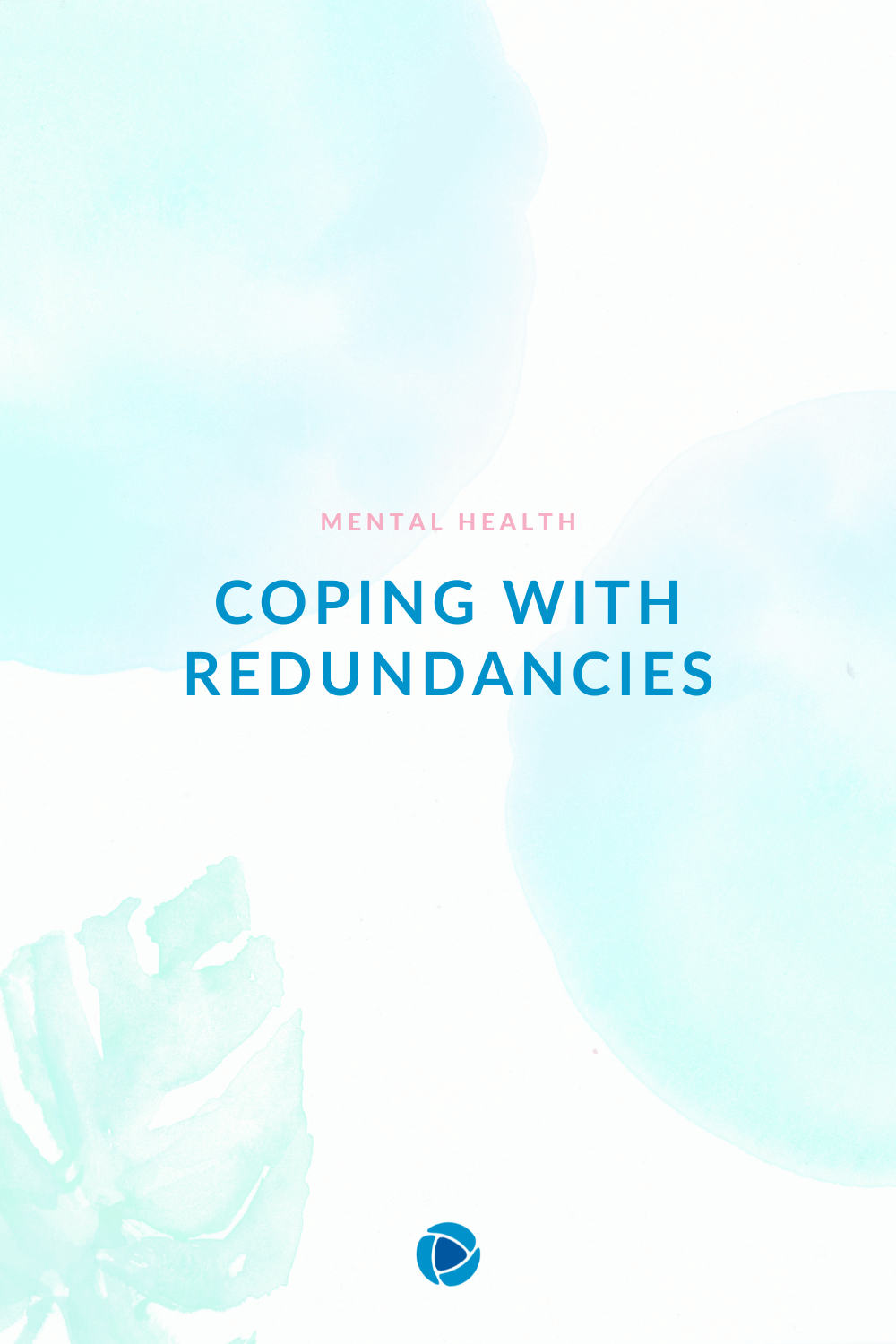
November 26, 2020
Coping with Redundancies
Due to the current crisis, many organisations had to make drastic structural changes and reductions in their workforce. Others still have employees furloughed who may fear also being made redundant soon.
Redundancies can be very stressful and can mean a significant life change. They can affect our self-confidence and challenge our sense of purpose and identity that work provides. It is common to experience feelings of disbelief, denial, anger, loss of confidence and sadness in the face of a loss which is usually outside of our control. Some of us may think ‘why me?’ Others may be more relieved and feel excited to start something new. We all react differently in times of change and uncertainty, but it is human nature to perceive uncertainty as a risk. It is completely normal to feel worried, sad or stressed as a result, especially if it comes as a surprise.
Change inevitably creates uncertainty. When things stay the same we feel comfortable knowing what to expect on a day to day basis. When something shifts, even our sense of who we are can go through some odd and potentially uncomfortable alterations. Try not to judge yourself. It’s okay – and perfectly normal – to be nervous about change. It’s also normal to have a hard time managing the transition. No matter how awkwardly or uncomfortable you might feel though, it’s important to be kind to yourself and share your feelings with others. Social support is a great way to deal with uncertainty as it allows you to proactively troubleshoot problems and consider different approaches. Whilst this redundancy may have come as a shock to you, try to embrace the experience and consider this transition as an opportunity to build internal psychological, emotional, and intellectual “muscle” that will help you with the next change.
However, sometimes, worrying can feel hard to control. Rather than trying to stop it altogether, one technique is to allocate yourself a ‘worry budget’ where you can dedicate time to think about your worries. Dealing with worries in this way can help to challenge hypothetical concerns, negative emotions and to put things into perspective, as well as make you feel more confident and productive. Start with creating a list of worries as and when they come into your head. Then, allocate yourself no more than 30 minutes per day at a specified time to work through your worry list (do this somewhere that you won’t be disturbed and that you don’t associate with sleep or relaxation) and when the time comes, work through your worry list one by one and sort it into things you can do something about now and things you might have to deal with at a later date. Think about how you might solve some of these worries and make a plan to tackle them. For hypothetical worries (e.g. “what if I don’t get another job”) ask yourself “then what?” and think about what you would do and how you would manage it or prevent it from happening (e.g. “I will apply for 1 job a day and reach out to my networks”). This might feel a bit strange in the beginning, but over time this process will become automatic as you learn cognitive skills for proactively managing worries, rather than letting them overwhelm you.
The loss of a job could also raise concerns about our finances and the payment of future bills. To manage financial pressure, think about your budget. Are there areas you can cut back on? Could you save money by switching bill providers, changing tariffs on your mobile or broadband, or switching to cashback sites when shopping online? Making several small changes may not seem like much, but together they can go a long way. Remember to check if there are any benefits or grants you may be entitled to whilst looking for a new job. Thoughtfully managing your finances can be key to reducing feelings of stress and worry.
Others of us might feel very lonely and isolated. First, you may want to realise that loneliness is more of a feeling than a fact. Consider visiting places where you are around other people like a park. Also, push yourself and reach out to friends and initiate meetings and telephone calls even when your loneliness is telling you not to. Alternatively, you may want to find some online peer support (visit Mind for more information). There, you might find people who are going through similar life-changing experiences or who are just happy to connect with you. You may also want to consider volunteering in your community. This will not only help you to meet others but may also give you purpose and meaning in your life which can increase happiness and life satisfaction.
While we often struggle to see redundancy as a ‘good thing’, it can present the opportunity to help you take stock of your skills, talent, and experiences. Is there anything you want to change in your career? Have your goals remained the same or is now the chance to start on a new journey? Think about your options and identify where your passions are. If you aren’t sure what your passions are, what you want to do next, or what your long-term goals are you could speak to friends, family or old colleagues. Sometimes speaking about it and reflecting with others helps us to move forward.
Start with updating your CV and professional/social media accounts (e.g. LinkedIn). Take the time to consider all of the skills, tasks and achievements from your last role and how you can take these forward into a new position. Your CV should outline your goals, experience, accomplishments and personality. Also, have a clear social media presence, be proactive on groups, and have an active, engaged account on websites like LinkedIn, professional Facebook groups, and Twitter. Share your expertise and industry knowledge; the more you put yourself out there, the more you can start raising your profile and increase the chance to be noticed by future employers.
Remember, it is very important to take care of yourself to stay well during this time.
1. Reframe the situation
what can you change and what is out of your control? Could this redundancy actually help you to achieve new goals and help you to grow? Is there something you always wanted to change or do? You may not have control over losing your job, but you can control how you deal with that loss and move forward.
2. Reframe your position
You may try not to think “I was made redundant”, but rather “My position was made redundant”. This may help you see that this was not a personal critique of your skills but rather a necessary business decision. This can help to protect your self-esteem.
3. Stay connected and share your feelings
Friends, family and colleagues make a great support network. It can sometimes feel hard to reach out for support, but speaking with your loved ones can be a crucial part of the redundancy process. It’s important to be as open and honest with your partner or close support networks as early on as you can. Together, you can tackle any financial or emotional worries; you don’t have to face these alone. Remember that you have nothing to be ashamed of; redundancy can happen to anyone, at any time.
4. Be mindful & practice meditation
Mindfulness is being fully present, fully thoughtful and deeply immersed in the moment to moment experience. The way we think, and the content of our thoughts, affects how we feel and act. Awareness helps us notice signs of stress or anxiety earlier and helps us deal with them better.
-
- Relaxation exercises can tackle those fight, flight or freeze symptoms we might be feeling in stressful situations by helping us to slow down our heart rate and calm our mind.
- Mediation can help us to build awareness of how worrying thoughts capture our attention and how to let go of them. Meditation is a skill that requires practice and might not be for everyone but is worth trying.
- Other ways you can be mindful might include going for a walk, doing yoga, reading, or anything else that helps to relax and distract your mind.
5. Organise your time
Make lists, plans and daily calendars. Time management is key to helping you feel in control and able to handle the pressure.
6. Structure and routine
Try to keep a structure or schedule in your day. Creating a routine enables you to set clear boundaries. For example, stick to a similar sleep schedule, get up at the same time as you would do for work, and be strict with yourself about when you look for new job opportunities and when you do something you enjoy. A clear structure during the day will help you to stay well and switch off each day.
7. Set yourself small manageable goals and make sure to take the time to appreciate achieving even just the small daily goals that you set for yourself
8. Be active
Exercise won’t make stress disappear, but it may clear your thoughts which helps when dealing with stress.
We hope this blog will help you to manage your wellbeing and will allow you to focus positively on the road ahead.
Topics mentioned in this blog post:
Get the latest news with
Thrive Unplugged!
Sign up to our monthly newsletter to receive the latest news on everything Thrive Mental Wellbeing.








